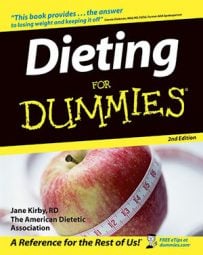Dieters face pitfalls, some of which have to do with emotions, habits, or feelings of self-worth. But eating is not a moral issue. Your body requires nutrients to live. Sticking to a diet does not define you as a good or bad person. Eating and hunger are part of the human condition.
Here are some healthy diet stumbles you can step around if you give them careful consideration:
Do you always clean your plate? Whether this comes from well-meaning parents or a fear that you’ll never eat a meal this good again, it’s a particular problem for dieters and most overweight people.
This kind of behavior means that you probably lost track of your hunger mechanism and can no longer recognize when you’re no longer hungry. Membership in the Clean Plate Club can be especially hazardous for people who eat out often, because restaurant portions can be gigantic and arbitrary. A solution is to order only from the kid’s menu or appetizer portions. And don’t ask for super-size portions at fast-food places.
Do you eat out of boredom? Classic research on dieters and nondieters showed that when faced with monotonous tasks dieters and nondieters alike ate more crackers. When they engaged in a stimulating mental activity, such as a creative writing project, they ate fewer crackers.
Do you eat healthfully around others but splurge alone? Overeating only when you’re alone is usually the result of buying into the diet industry propaganda that you hear from television, well-meaning friends, and your own inner voice: “Don’t eat too many calories,” “You shouldn’t eat that,” “Foods get labeled, and if you eat these good or bad foods, you become good or bad.
These thoughts can make you restrict your eating so severely that when you’re calm, alone, and not afraid of being judged, you splurge and enjoy all the foods that you otherwise think you shouldn’t eat. This kind of restrictive eating keeps the diet treadmill rolling.
Do you feel unworthy or guilty about eating: Feeling unworthy to eat or guilty about eating also comes from the food police at work. And it’s classic diet-think. Cognitive therapists know that when a negative thought leads to negative feelings, negative behavior is sure to follow.
If finishing the bag of chips or the entire burger is your pattern, buy smaller sizes. Counter the fear-of-famine mentality by remembering that more is always available and that, yes, you will have a meal that good again.

